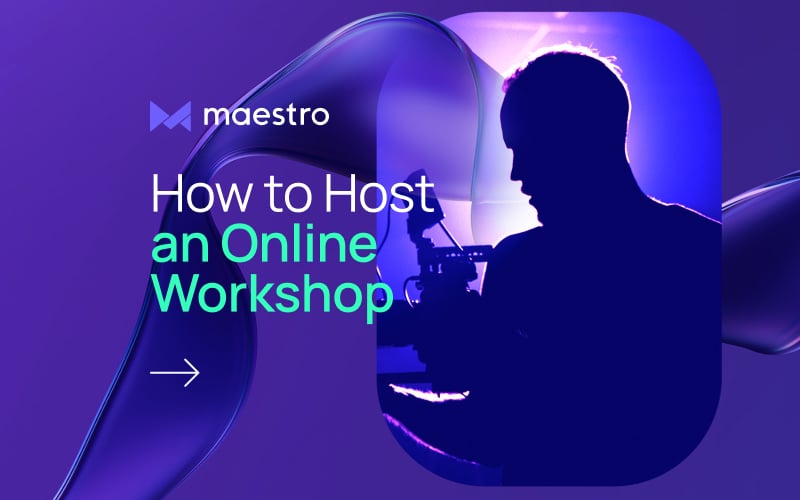How to Host an Online Workshop in 5 Steps

Do you want to attract potential customers or improve the success rate of your current customers? Do you want to improve your brand and make money with virtual events?
These days, your customers, prospects, and employees are likely more comfortable with virtual learning than ever before, so let’s make sure you can reach them with an online workshop of your own.
In this post, we’ll break down what an online workshop is and how you can host one in just five steps.
Table of Contents
What is an Online Workshop?

An online workshop is a structured, interactive learning event that takes place virtually. The biggest difference between an online workshop and other common digital education tools – such as webinars or online courses – is the hands-on nature of a workshop.
Instead of passively consuming the educational material, attendees of your online workshop can participate in group discussions and engage in enriching activities. They may even get a chance to put the new skills they’re learning into practice during the event.
In addition, interactivity is a key facet of online workshops. In most workshops, the audience will interact with other attendees and with the host to better absorb the material. We’ll cover more about how to make an online workshop interactive later in this article.
3 Types of Online Workshops
Remember the benefits of online workshops we mentioned earlier? You can achieve them for your organization with three types of online workshops:
- Training: A training workshop will enhance participants’ knowledge and skills in a specific subject area. This is helpful for both hard skills, like competency with a certain software tool, and soft skills, like leadership and communication.
- Team building: A team building workshop will improve the dynamics of a group or team. This is especially useful for remote work and could include personality assessments or various problem-solving challenges.
- Product demo: A product demo workshop will allow you to walk users through the use of your product or service. This can dramatically boost awareness and adoption of specific product features or new product launches.
There are a lot of different types of workshops out there, but chances are most of your use cases will fall under one of these three.
If you haven’t already thought about some potential training, team building, or product demo workshops you could launch, we recommend taking a moment and brainstorming a few ideas for each one.
Benefits of Hosting Online Workshops
Whatever goals you have for your business or organization, an online workshop is an excellent way to make them happen. Here are a few benefits you can enjoy with online workshops:
- Build authority in your space: When you teach people solutions related to your industry, you’ll be viewed as more authoritative than experts and businesses who don’t produce content and education. You can elevate your brand with quality online workshops.
- Generate leads: Prospects in the problem-aware or solution-aware stages of the buyer’s journey often need more education on how to solve a current problem. An online workshop can help them do that, which may lead to qualified leads and closed-won sales.
- Boost retention: No matter your product or service, it’s likely that customers will have a learning curve before they can get the greatest value from it. A workshop can teach them how to maximize your offering so they stick with it and become long-term customers.
- Make extra revenue: A workshop that teaches people something can be a profit center in its own right, including through transactional video on demand (TVOD) ticket purchases upfront and/or as a subscriber-only event.
- Improve employee performance: While you may be considering the external-facing value of workshops, they also can add tremendous value within an organization. Don’t overlook the possibility of using online workshops to boost employee morale and performance.
How to Host an Online Workshop

Now that you know about online workshops, including three of the most common types of online workshops, it’s time to learn how to host one yourself.
The good news is, hosting an online workshop can be as simple or as complex as you need it to be. What really matters is defining a specific goal for the workshop – then, you can back up from there to make sure everything you do is in line with that goal.
1. Planning
It’s no surprise that your first step is to plan out your online workshop. With any event, you should decide on these three things right off the bat: the goal of the event, the target audience, and the workshop format.
The workshop goal might be growing brand awareness, generating leads, educating your customers, or making sales. Just because you pick one primary goal doesn’t mean the other goals can’t happen, but it informs every other decision you make about your workshop.
For the target audience, you should be aware of your customers or stakeholders and define who you’re trying to reach. This goes hand-in-hand with the goal of the workshop because you’re probably going to try to get attendees to do something as a result of the workshop.
The workshop format is also important. Decide if this will be a one-time event or a series. Will it be 100% live, or will it include pre-recorded elements?
If you can complete the planning stage with some well-thought-out answers, you’ll set yourself up for much greater success with your online workshop.
2. Preparation
When it comes to preparation, this is all about starting to think through the workshop itself. If you know what your goal is and what your audience is hoping to learn from the workshop, you can start outlining the class and breaking it down into different sections.
With an outline ready to go, you’ll want to craft an agenda and a detailed script. It’s also important to think about the visual component of your online workshop. Will you be utilizing slides? Video? One or more live instructors?
As the workshop content starts to take shape, you’ll have to make sure you know who will be presenting the material and that they’re practiced at delivering it.
From a technical standpoint, it’s also important to make sure all of your hardware and software are working properly, from cameras to the internet connection. You’ll also need a streaming platform that is equipped with the tools you need for interactivity and monetization.
We encourage you to check out Maestro, the perfect platform to host your online workshop. Get started for free!
3. Promotion
Promotion will likely overlap with preparation, but it’s a totally different area of focus. While preparing the actual workshop to ensure it delivers on its promise, you also need to spread the word about your workshop in order to maximize attendance.
All of the usual promotion methods apply here, including:
- Owned channels like your website, blog, email, and social media
- Partnerships with other service providers, influencers, and businesses
- Paid channels like YouTube Ads, Facebook Ads, or LinkedIn conversation ads
Other things to think about at this stage include coming up with a quality event description and possibly a dedicated landing page for signups. This process is important because an online workshop is a virtual event that really benefits from live participants.
Make sure you highlight the benefits to attendees for attending the workshop live!
4. Execution

You’ve planned, prepared, and promoted your online workshop. Now, it’s time to host it.
First of all, build in slack time to ensure you’ve worked out all the technical glitches that may be there. You can also be there to welcome attendees that join early and make a good first impression.
Once you hit the official start time and kick off the workshop, all of the hard work up until now will pay off. You can present the material and manage any group discussions, Q&As, or activities. Thanks to some robust online workshop tools, Maestro allows you plenty of flexibility in adding interactivity to your workshops – it’s a good idea to do as much as you can to keep participants engaged.
Lastly, no matter how tempting it is, you need to stick to the schedule. Don’t let the conversation veer off. You need to cover all of your talking points to convey the material to your audience, and you also need to be respectful of people’s time.
Hopefully, the execution stage will go off without a hitch, and you’ll have the participants singing your praises for a fantastic session!
5. Follow-Up
After the workshop is over, it’s wise to follow up with attendees via email and thank them for being there.
This also gives you a chance to engage with anyone who either couldn’t attend or didn’t catch the whole event. Share the workshop recording and any other supplementary materials, like your slides, notes, and other information that your audience would appreciate.
The most important thing with the follow-up is keeping the communication going so that you can potentially do more online workshops or other live events in the future. There’s a range of things you can do to keep your audience engaged, such as blasting a post-workshop survey for them to provide their feedback, as well as sending
Aside from communication with your audience, it’s worth doing a general post-mortem on your event to gauge performance. What percentage of RSVPs ended up attending? How long did participants stick around, on average? How close were you to achieving your overall goal for the workshop?
Answer these questions to evaluate what you did well and what you could improve on. Following up gives you the chance to host an even better online workshop next time, so take the time to make sure you’re setting yourself up for future success!
Host an Online Workshop on Maestro

Hosting an online workshop is a powerful tool for growing your brand, generating extra revenue with TVOD/ticketing, or improving the performance of your internal teams. Even better, you don’t have to be a tech wizard to pull it off!
If you need a platform that can host your online workshops, Maestro is the solution for you. Our streaming platform supports both live and on-demand video streaming, so you can easily reach your audience and interact with them virtually.
What makes Maestro unique is that we offer a variety of tools to make your online workshops more engaging and interactive. Additionally, we offer a slew of video monetization tools, so you generate revenue from your virtual live events.
Are you ready to host your online workshop on Maestro? Sign up today to launch your next workshop for free.
Join our Discord server for more helpful tips and tricks!